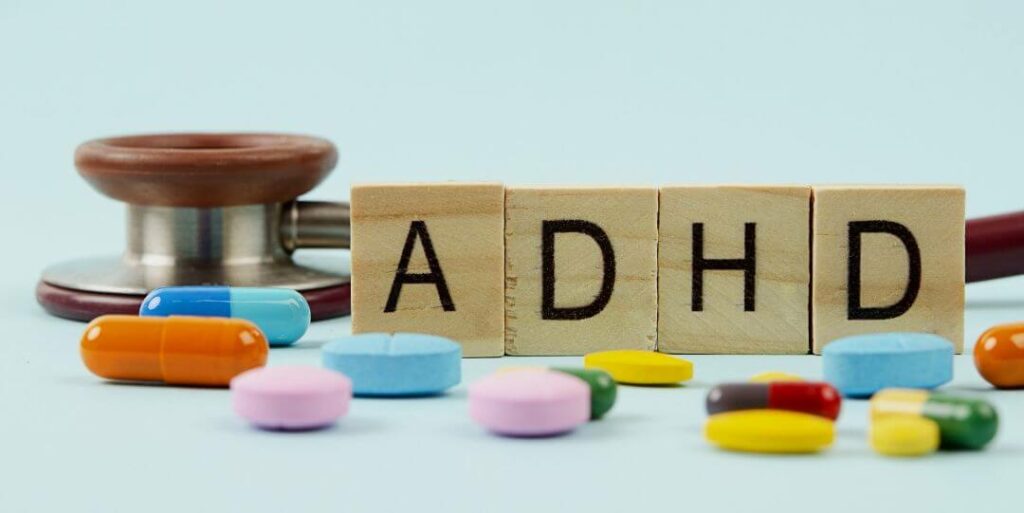Attention Deficit Hyperactivity Disorder (ADHD) is a condition that affects many people in different ways. Some common symptoms include trouble focusing, hyperactivity, and impulsiveness. Stimulants are a type of medication that is often prescribed to help people with ADHD manage their symptoms. In this blog post, we will discuss how stimulants work to help people with ADHD, as well as the side effects that can occur.
Contents
What Are Stimulants For ADHD?
 Stimulants are the most commonly prescribed medications for attention deficit hyperactivity disorder (ADHD). This is because they have the longest track record of being effective at treating ADHD symptoms. Stimulants for ADHD are believed to show brain chemicals that are involved in controlling focus, paying attention, and self-control.
Stimulants are the most commonly prescribed medications for attention deficit hyperactivity disorder (ADHD). This is because they have the longest track record of being effective at treating ADHD symptoms. Stimulants for ADHD are believed to show brain chemicals that are involved in controlling focus, paying attention, and self-control.
It helps in managing the symptoms of ADHD, such as;
- Inattention: difficulty sustaining attention in tasks or play, often letting the mind wander
- Hyperactivity and impulsivity: fidgeting, nonstop talking, running around at inappropriate times.
So, stimulants for ADHD can have short-term and long-term benefits for people with ADHD. Still, they are not a cure. While they may help with some symptoms, other treatments will likely be needed to manage the condition over time.
How Do Stimulants For ADHD Work?
Stimulants for ADHD work by increasing the levels of dopamine and norepinephrine in the brain. This increase in neurotransmitters helps to improve focus, concentration, and motivation. It works by binding to the dopamine receptors in the brain and inhibiting the reuptake of dopamine. This allows more dopamine to be available which leads to improved focus, concentration, and motivation.
According to studies, about 70% of people with ADHD who take stimulants see a significant improvement in their symptoms. It is believed that stimulants for ADHD help to improve symptoms by correcting the underlying chemical imbalance that is thought to cause ADHD.
Therefore, consider taking stimulants for ADHD if you are finding it difficult to focus, concentrate, or be motivated. However, it is important to be aware of the potential side effects of stimulants before taking them.
What Are Some Examples Of Stimulants For ADHD?
 There are many different types of stimulants that can be used to treat ADHD. Also, it is categorized into three different types, these include;
There are many different types of stimulants that can be used to treat ADHD. Also, it is categorized into three different types, these include;
- short-term acting
- intermediate-acting
- long term acting forms
In short-term acting forms, the effect of the medicine lasts for about four hours. The prescription is to take 2-3 times a day. It serves a major benefit as it allows you to take control of your medicine.
Intermediate-acting forms last for about six to eight hours. The medicine is prescribed to be taken two times a day, once in the morning and once at noon. It is beneficial as it covers most of the school or workday.
Long-acting forms last for about 12 hours. The medicine is prescribed to be taken once a day, usually in the morning. It covers most of the day and evening.
Examples of stimulants include;
These are just a few examples, as there are many different types of stimulants that can be used to treat ADHD. Speak with your doctor to see if a stimulant is right for you.
Who Should Avoid Stimulants For ADHD?
Though stimulants for ADHD can be helpful for some people, they’re not right for everyone. If you have certain medical conditions or are taking certain medications, stimulants may not be safe for you. Be sure to talk to your doctor before starting any new medication, especially if you have:
- Heart disease
- High blood pressure
- History of substance abuse
- Anxiety or depression
- Seizure disorder
- Tics or Tourette’s syndrome
You should also avoid stimulants if you’re pregnant or breastfeeding. If you have any concerns about taking stimulants, be sure to talk to your doctor. They can help you weigh the risks and benefits of taking a stimulant.
Moreover, research suggests that certain lifestyle changes may be just as effective as stimulants for ADHD. But, it should be used simultaneously for more positive results. Also, before starting any medication it is essential to speak with a doctor.
What Are The Side Effects of Stimulants?
Usually, stimulants are well-tolerated, but some people may experience side effects. The most common include:
- decreased appetite
- trouble sleeping
- anxiety or irritability
- headache
- dizziness or lightheadedness
Rarely, stimulants can cause more serious side effects, including:
- cardiac problems
- psychotic symptoms
- seizures
These side effects are more likely to occur when people take high doses or abuse stimulants. If you experience any of these side effects, stop taking the medication and talk to your doctor. Also, it is necessary to understand that stimulants for ADHD can be addictive. If you have a history of substance abuse, talk to your doctor about the risks and benefits of taking stimulants.
While stimulants are generally considered safe when taken as prescribed. But it is important to talk to your doctor about any concerns you may have. Stimulants can interact with other medications and may not be appropriate for everyone.
What Things To Avoid While Taking Stimulants for ADHD?
 When taking medications for attention deficit hyperactivity disorder (ADHD), it’s important to follow your doctor’s instructions. This includes not only taking the correct dosage of medication. But also avoiding certain foods and activities that can interfere with the effectiveness of the medication.
When taking medications for attention deficit hyperactivity disorder (ADHD), it’s important to follow your doctor’s instructions. This includes not only taking the correct dosage of medication. But also avoiding certain foods and activities that can interfere with the effectiveness of the medication.
Some things to avoid while taking stimulants for ADHD include:
Eating large meals
When you intake stimulants for ADHD, it is advised that you eat small, frequent meals throughout the day as opposed to large ones. This is because large meals can affect how well the medication works. Also, it can cause stomachache and/or dizziness. Eating large meals actually decreases the effectiveness of ADHD medications. More often, it leads to a longer “high” followed by a crash.
Drinking alcohol
You should avoid drinking alcohol while taking stimulants for ADHD. This is because alcohol can interfere with the way the medication works. It can also make the side effects of the medication worse. In fact, alcohol can make some side effects, such as sleep problems and anxiety, more severe. Alcohol is also a depressant, which can counteract the effects of stimulant medication. This is why it’s important to avoid drinking alcohol while taking stimulants for ADHD.
Using other drugs
It’s important to avoid using other drugs while taking stimulants for ADHD. This includes both illegal drugs and prescription medications. Taking other drugs can interfere with the way the medication works and can also make the side effects worse. If you need to take another medication, be sure to talk to your doctor first. Moreover, avoid using illegal drugs, as they can also interact with the medication and make the side effects worse. As it is believed that ADHD and addiction share some common risk factors, using drugs can worsen the symptoms of ADHD.
Missing doses
It’s important to take the medication as prescribed by your doctor. This means taking it at the same time each day and not missing any doses. Missing doses can make the medication less effective. It can also cause the symptoms of ADHD to return. If you do miss a dose, be sure to take it as soon as possible. In fact, sudden withdrawal from stimulant medications can cause side effects such as sleep problems, depression, and fatigue. Also, it’s important to avoid stopping the medication suddenly, as this can also cause withdrawal symptoms.
Avoid Driving Or Operating Heavy Machinery
 This is often advised to avoid because the side effects of the medication can include dizziness and sleepiness. If you must drive or operate heavy machinery, be sure to do so with caution. That is why it is always best to check with your doctor before driving or operating heavy machinery while taking stimulants for ADHD. Moreover, avoid driving or operating heavy machinery if you are feeling dizzy or sleepy.
This is often advised to avoid because the side effects of the medication can include dizziness and sleepiness. If you must drive or operate heavy machinery, be sure to do so with caution. That is why it is always best to check with your doctor before driving or operating heavy machinery while taking stimulants for ADHD. Moreover, avoid driving or operating heavy machinery if you are feeling dizzy or sleepy.
Stay calm and avoid stress
Stress can actually make the symptoms of ADHD worse. It can also interfere with the way the medication works. Therefore, it’s important to try to avoid stressful situations while taking stimulants for ADHD. If you find yourself in a stressful situation, take a few deep breaths and try to relax. This will help you stay calm and avoid making the situation worse. Also, avoid taking on too much at once. This can lead to feeling overwhelmed and stressed. Be sure to take breaks often and delegate tasks when possible.
In general, it’s important to follow your doctor’s instructions when taking any medication. This is especially true for stimulants for ADHD. You should follow your doctor’s orders in regard to dosage, timing, and avoiding certain activities. Doing so will help ensure that the medication is effective and that you don’t experience any serious side effects.
Conclusion
To conclude, stimulants for ADHD are very effective in treating the symptoms of ADHD. However, they can also have some side effects, so it is important to talk to your doctor about whether or not they are right for you. There have been studies that suggest that long-term use of stimulants may lead to some problems. So it is important to be monitored by a doctor if you are taking them.
Moreover, it is important to remember that everyone with ADHD is different, so what works for one person may not work for another. Be sure to talk to your doctor about all of your options and make the decision that is best for you. And, be patient with the recovery process, as it takes time to find the right treatment plan.
For more information, please contact MantraCare. ADHD is a neurodevelopmental disorder characterized by difficulty in paying attention, hyperactivity, and impulsivity. If you have any queries regarding Online ADHD Counseling experienced therapists at MantraCare can help: Book a trial ADHD therapy session


